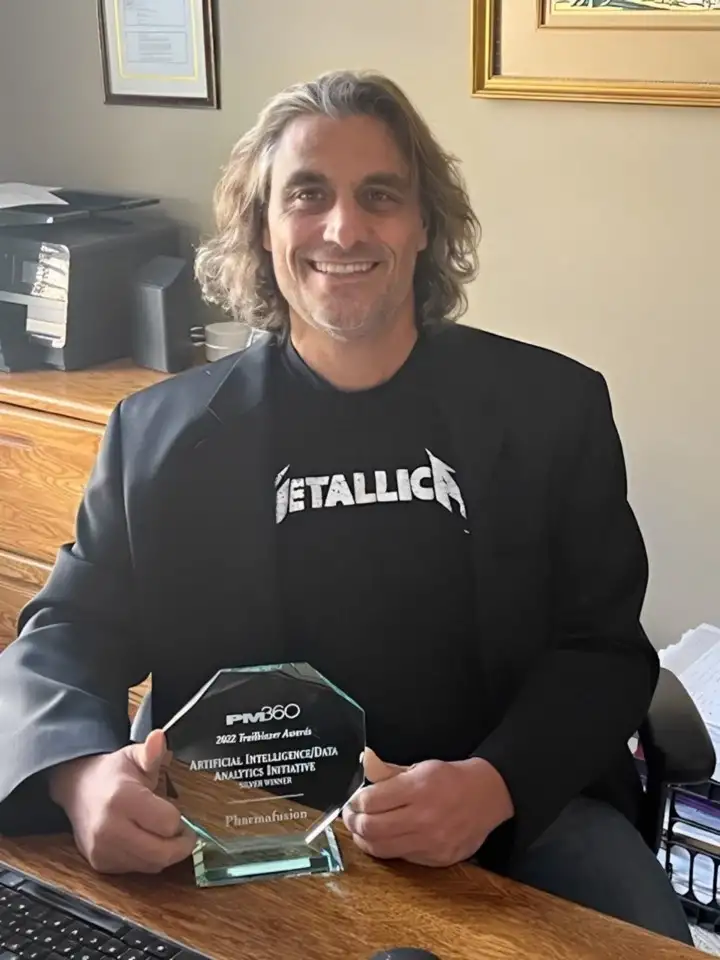
An Interview With Ben Ari

Everyone in the organization must buy into the belief that data is an asset. They must become more literate and data savvy.
The proper use of Data — data about team performance, data about customers, or data about the competition, can be a sort of force multiplier. It has the potential to dramatically help a business to scale. But sadly, many businesses have data but don’t know how how to properly leverage it. What exactly is useful data? How can you properly utilize data? How can data help a business grow? To address this, we are talking to business leaders who can share stories from their experience about “How To Effectively Leverage Data To Take Your Company To The Next Level”. As part of this series, we had the pleasure of interviewing Jonathan Retano.
Retano is the founder and CEO of Pharmafusion, a cloud-based analytics company that provides one of the only, if not the only, turn-key pharma analytics platforms, Pharmafusion360. Based on his wide-ranging industry experience over a career that spans more than 25 years, Retano developed the platform to enable pharma company leadership teams to have quick and comprehensive access to nearly 100 datasets critical to sales, market access, supply chain, finance, gross-to-net (GTN), and more. Nearly anyone can create reports and dashboards — — what sets Retano and Pharmafusion apart is their ability to provide real insights that help drive scripts and increase revenue in emerging pharma, top-20 global pharma, medical billing, and life science consulting. In just five years, Retano and the Pharmafusion team have won more awards than any other organization in the field of Pharma analytics, including, most recently, the Trailblazer Award from PM360.
Thank you so much for joining us in this interview series. Before we dive in, our readers would love to “get to know you” a bit better. Can you tell us a bit about your ‘backstory’ and how you got started?
Inthe movie “Taken,” Liam Neeson describes himself by saying, “I do have a very particular set of skills, skills I have acquired over a very long career.” Similarly, I have had an interesting career path in pharma, including roles in Commercial Operations, Finance, and even IT. Seeing the business from the unique perspective of revenue generation, finance roles, and technical roles has allowed me to see where things break down between these three critical pillars. In my last corporate pharma role, I found myself running Trade and Market Access, yet I never had direct access to the information I needed to make critical business decisions. Instead, I had to email someone else or spend valuable time tracking down what I needed.
In the band Triumph’s song “Magic Power,” they have a line, “the world is filled with compromise and infinite red tape.” That is how I felt, so I decided to teach myself all the IT code I needed to pull data and software to perform data visualization. When I combined that with my business knowledge of Brand and Generic Pharma, I knew I had my three pillars. These three pillars form the base of what we call an “Analytics Concierge” — someone who knows the business, knows code and, most importantly, knows how to communicate and tell stories with data.
It probably started in 2008 when I built the first enterprise-wide pharma analytics data warehouse. At that time, there was nothing like it. In fact, I won an award from the Data Warehousing Institute. I guess you can say that is where my passion for pharma data and analytics was born. Four years after that, I set out on a mission to build a single all-inclusive ecosystem of pharma information that would have everything in one platform. What Amazon did for holiday shopping, I wanted to do for pharma analytics. The result is Pharmafusion360. We operate with the motto, “One Login, One Platform, All Your Data.”
It has been said that sometimes our mistakes can be our greatest teachers. Can you share a story about a humorous mistake you made when you were first starting and the lesson you learned from that?
To be honest, I think my biggest mistake was not having the confidence to start Pharmafusion sooner. Having a mortgage, wife, and kids, it is hard to give up the comfort of a corporate job. Beyond that, I made the mistake of thinking most companies have this data thing figured out — especially the larger companies. Well, I quickly learned that the initial premise was wrong. Not many pharma companies, even the large ones, have this data thing figured out.
Leadership often entails making difficult decisions or hard choices between two apparently good paths. Can you share a story with us about a hard decision or choice you had to make as a leader?
Going out on my own and entering an established and largely spoken-for industry was a huge leap of faith. Yet one of the main reasons I started Pharmafusion is that data and the insights we draw from it have remained largely unchanged for 30 years. We still operate under the assumption that “whoever has the data has the best data.” This couldn’t be further from the truth. Pharmafusion has access to all the data the “big guys” have, but we customize everything, so you only see what you need. On top of this, we add expert insights from real pharma industry vets to help disseminate what the data is sharing. Quality over quantity is how we operate. You don’t need all the data; you need the right data for your particular circumstance.
Are you working on any new, exciting projects now? How do you think that might help people?
To date, one of the most rewarding elements of the business is that we are finding that what we do is transferrable to different industries. While pharma is our bread and butter, the platform can be customized to service many industries. We’ve been working with pharma and medical billing since our inception, yet we are now in the process of building modules for accounting, cannabis, and other life science verticals. It reinforces our value proposition that having the right data helps you make informed business decisions, no matter the industry.
You are a successful business leader. Which three character traits do you think were most instrumental to your success? Can you please share a story or example for each?
Tenacious We sell a service, not a product. Because of this, our “pitch” can vary depending on the potential of each client’s needs. Things would be a lot easier if we landed every pitch on the first meeting, but our business model requires a test drive of the platform to win new business. Seeing really is believing, and we’ve had successful pitches that don’t materialize and, alternatively, landed business when meetings didn’t go according to plan. We are always tenacious and persistent in business development because our growth depends on it.
Approachable: We want all our clients to feel like partners. While there is the necessary formality to conduct good business, we like to keep things light and casual. We always have the lines of communication open. We find that many of our clients become our friends because our working relationships lend themselves to feeling comfortable and collaborative.
Attentive: There’s a fine line between over-communicating and providing top-notch customer service. We describe our customer service as “concierge” style because we are always available and move at the same pace the data does. Data doesn’t stop for vacations or holidays. If you need us, we’re there and available for you. We pride ourselves on that type of round-the-clock care, and our clients find that level of service distinguishing.
Thank you for all that. Let’s now turn to the main focus of our discussion about empowering organizations to be more “data-driven.” For the benefit of our readers, can you help explain what it looks like to use data to make decisions?
Data is always changing. Pharma and biotech, perhaps even faster than most industries. It’s our job to ensure our clients have what they need for their businesses today and are prepared and ready for what’s around the corner. Our competitive monitoring, predictive analytics, and industry knowledge make us thought leaders and indispensable resources for our partner companies.
Based on your experience. which companies can most benefit from tools that empower data collaboration?
You can easily spot the companies that use data most effectively. They’re always adapting and aware of the industry trends and competition. We service all different size companies, but we love stewarding emerging pharma companies to learn how to harness data when launching a new drug/product. Starting from nothing, we can create customized solutions that become the framework of their operations.
Can you share some examples of how data analytics and data collaboration can help to improve operations, processes, and customer experiences? We’d love to hear some stories if possible.
One of our biggest areas of operational improvement with companies is time saved. Money saved goes together with that, but so much manual data manipulation is going on. Formatting spreadsheets, data dumps, you name it. We constantly have people saying we saved them 10–15 hours of work a week just on automated reports, reformatting data, and other modules within the platform.
From your vantage point, has the shift toward becoming more data-driven been challenging for some teams or organizations? What are the challenges? How can organizations solve these challenges?
The challenges we see aren’t moving toward data adoption but changing the way you receive and process data. So many companies have been doing things the same way because “that’s how it’s always been done” or “that’s how my predecessor did it.” That’s not the Pharmafusion way. We are breaking the mold on how data is integrated into pharma (and other industries) by making it accessible from the top down. Our platform provides benefits from the sales level all the way up to the C-Suite. In a data-savvy organization, all levels should be using it.

Ok. Thank you. Here is the primary question of our discussion. Based on your experience and success, what are “Five Ways a Company Can Effectively Leverage Data to Take It To The Next Level”? Please share a story or an example for each.
First and foremost, the C-Level must set the tone and often communicate that data is an asset and a natural resource that deserves respect because an effective data strategy translates into dollars. I hated the label that followed me in my career, that I was a “data guy.” Did that mean I did not understand the nuances of the business or how to motivate sales reps or execute a managed-care strategy? Absolutely not. That leads to my second point.
Everyone in the organization must buy into the belief that data is an asset. They must become more literate and data savvy.
Third, data needs context. It is worthless in and of itself. It must have some meaning, and that meaning must be clearly communicated. What is the data telling us, and how are we sharing that data story?
Thinking of data as a storyteller leads to my fourth point, which is that it’s essential to humanize the data. Don’t focus on the data per se. Instead, the key is understanding how, and in some cases helping others understand how, to experience the data.
Lastly, you can never spend too much time on data quality. An hour of data quality will save you hundreds of hours of headache time.
Based on your experience, how do you think the needs for data might evolve and change over the next five years?
First, I want to differentiate something. People don’t need more data. What they need are answers. Because there is so much data, the need will not be the data itself, but the answers and insights the data can provide. I liken it to playing Blackjack. It’s great that we have all this data, but all anyone really cares about is, “do I stand or take a hit.” Essentially, data and good data management help with decision-making.
The evolution will be to discern directives from the data. Based on the data we’ve learned, we should do these specific things to drive our business forward, and then we should go home and spend time with our family. We should not have to sift through infinite amounts of data. That should be done for us, and then the answers or directives from the data should be provided to us.
I think if there is one takeaway I can leave with your readers, it is that anyone can create a report or dashboard, but the real value that makes a difference in data analytics is in the way you experience insights through analysis. The end goal is not a dashboard; it’s a better understanding of your data and communicating that to others in your organization. This will lead to smarter decisions with positive bottom-line results.
Thank you for your great insights, We are nearly done. You are a person of significant influence. If you could inspire a movement that would bring the most amount of good to the most amount of people, what would that be?
I have been thinking about something for some time. And for many, it may bring about the most good.
In our lives, many of us go through the same cycles — get into a college; graduate; find a job; find a partner; get a house; have kids — it’s a story arc that is common. For many of us, the latest addition to that arc is the need to care for our aging and elderly parents.
I have this loosely conceived idea of some type of non-profit support group that covers all facets of this, from health care to financial planning, living arrangements, and more. There are so many details involved here. It sometimes feels like it would require the creation of the world’s greatest Excel spreadsheet simply to help manage all our parents’ medications.
There is even an opportunity to help another generation at the same time by pairing young adults that can’t afford to live on their own with elderly parents to help with groceries, doctor visits, and whatever other needs may arise. There’s no question these young adults would also benefit from this experience.
It is just an idea, yet the numbers don’t lie. The percentage of the population that is entering the “senior market” keeps growing, particularly as life expectancy increases.
Another idea I have is a rolling one-hour internet blackout by time zone to encourage families to eat dinner together without interruptions!
How can our readers further follow your work?
More information on our company can be found at pharmafusion360.com, and I welcome connections on my LinkedIn page at linkedin.com/in/jonathan-retano-8b10887.
Thank you so much for sharing these important insights. We wish you continued success and good health!
Thank you, you as well!